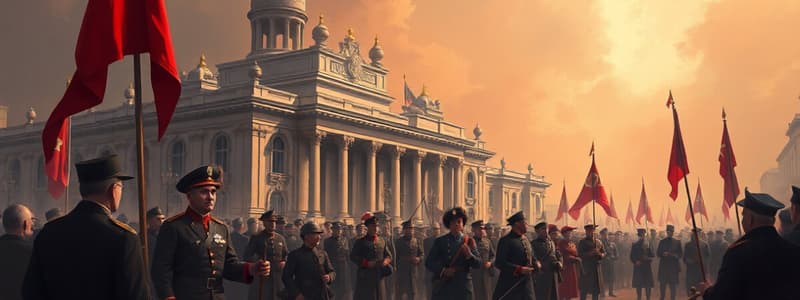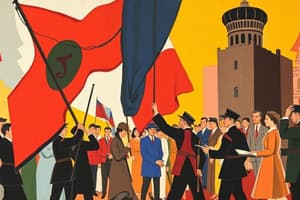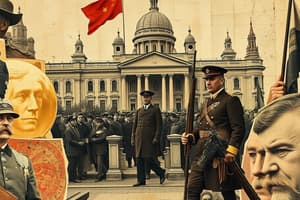Podcast
Questions and Answers
What was the main point of contention between the Provisional Government and the Soviets regarding World War I?
What was the main point of contention between the Provisional Government and the Soviets regarding World War I?
- The Provisional Government aimed for territorial gains, particularly control over the Black Sea straits, while the Soviets favored a defensive war. (correct)
- Both the Provisional Government and the Soviets were united in their commitment to continuing the war, but disagreed on the allocation of resources.
- The Provisional Government advocated for a defensive stance, while the Soviets pushed for territorial expansion.
- The Provisional Government wanted to end the war immediately through a separate peace treaty with Germany, while the Soviets insisted on continuing the war until complete victory.
How did the Provisional Government's decision to delay land reforms impact its authority and the overall stability of Russia?
How did the Provisional Government's decision to delay land reforms impact its authority and the overall stability of Russia?
- It strengthened the government's authority as peasants respected the decision to wait for the Constituent Assembly's ruling.
- It undermined the government's authority, as impatient peasants began seizing land illegally, leading to widespread unrest. (correct)
- It had no significant impact, as peasants were primarily concerned with the ongoing war effort.
- It led to a compromise where the government temporarily redistributed land until the Constituent Assembly could make a final decision.
What was the reaction of the Liberals within the Provisional Government to the granting of self-government to Ukraine?
What was the reaction of the Liberals within the Provisional Government to the granting of self-government to Ukraine?
- They proposed granting self-government to all national minorities within Russia.
- They supported the decision, viewing it as a necessary step towards national unity.
- They were indifferent, as their primary focus was on economic reforms.
- They were outraged, as they saw it as a step towards the disintegration of Russia. (correct)
What was the primary reason behind the failure of the Provisional Government's policy of increasing grain prices by 100%?
What was the primary reason behind the failure of the Provisional Government's policy of increasing grain prices by 100%?
What was the overall effect of the Provisional Government's use of punishment brigades in the countryside to requisition grain?
What was the overall effect of the Provisional Government's use of punishment brigades in the countryside to requisition grain?
Flashcards
Provisional Government's War Policy
Provisional Government's War Policy
The Provisional Government, led by War Minister Milyukov, aimed to continue World War I and gain territory, particularly control over the Black Sea straits.
Provisional Government's Land Policy
Provisional Government's Land Policy
The Provisional Government postponed land reforms, deferring the decision to a future Constituent Assembly.
Peasant Response to Land Policy
Peasant Response to Land Policy
Peasants grew impatient with the Provisional Government's delayed land reforms and began seizing land illegally.
Response to National Minorities
Response to National Minorities
Signup and view all the flashcards
Economic Measures and Repercussions
Economic Measures and Repercussions
Signup and view all the flashcards
Study Notes
- Explores how the Provisional Government addressed key issues, and assesses the success of its responses.
- Touches on the war, land redistribution, national minority demands, and the deteriorating economic situation.
The War
- The Provisional Government, led by War Minister Milyukov, aimed to continue the war and acquire territory, primarily control over the Black Sea straits.
- This position clashed with the Soviets, who favored a defensive approach to the war.
- The Summer Offensive was unsuccessful.
- The inclusion of socialist leaders stabilized the situation temporarily, but did not resolve the underlying disagreements about the war.
- The government's continued commitment to the war effort fueled discontent among soldiers and workers.
- Growing discontent contributed to the Bolsheviks' rise to power.
The Land
- The Provisional Government delayed immediate land reforms, stating that the issue should be resolved by the future Constituent Assembly.
- This frustrated the peasants.
- This response was unsuccessful because peasants grew impatient and began illegally seizing land.
- The government's failure to address land redistribution contributed to unrest and a lack of authority.
National Minority Demands
- The Provisional Government granted self-government to Ukraine.
- Liberals were outraged, viewing it as a step towards the break-up of Russia.
Deteriorating Economic Situation
- The Provisional Government increased the price of grain by 100%.
- Punishment brigades were sent into the countryside.
- These measures were ineffective because peasants were unwilling to sell grain due to a scarcity of goods to buy.
- The government's actions made peasants more hostile.
Studying That Suits You
Use AI to generate personalized quizzes and flashcards to suit your learning preferences.
Description
Explores the Provisional Government's approach to key issues like the war, land redistribution, and economic struggles. Assesses the success of their responses and the impact on the population. The government's stance on continuing the war fueled discontent and aided the Bolsheviks.




